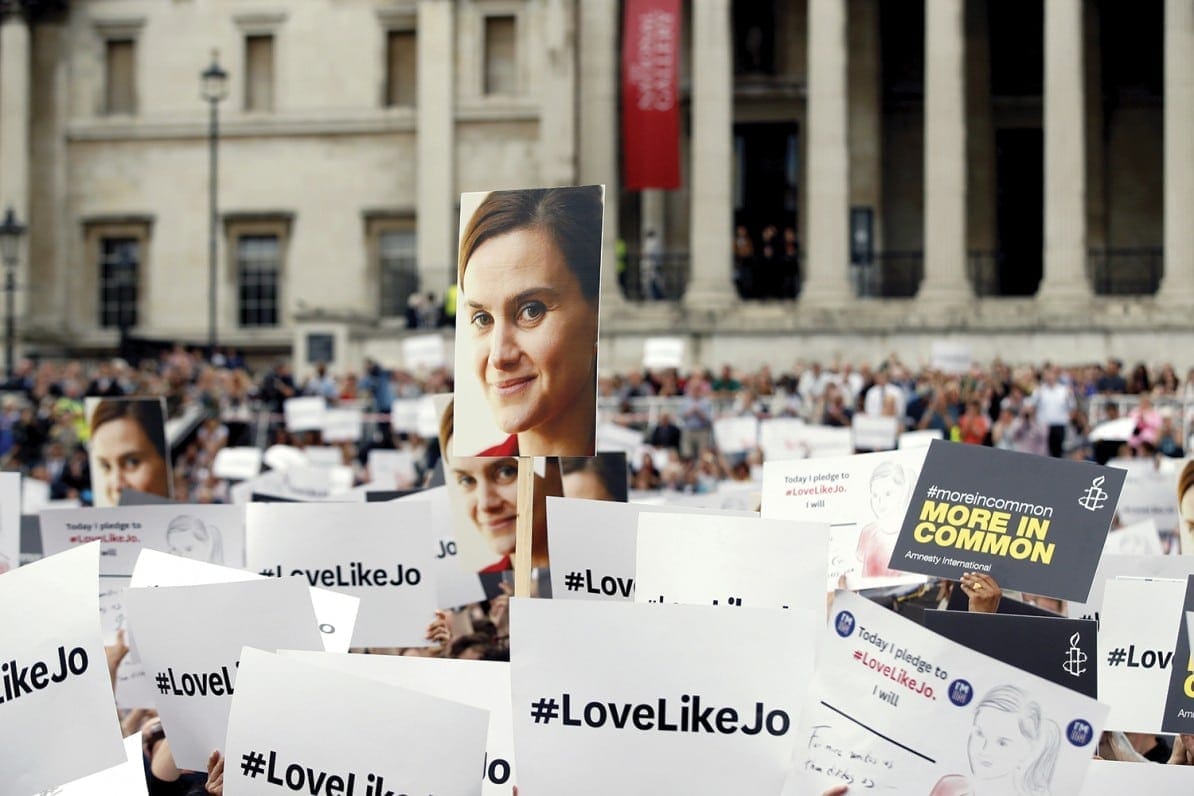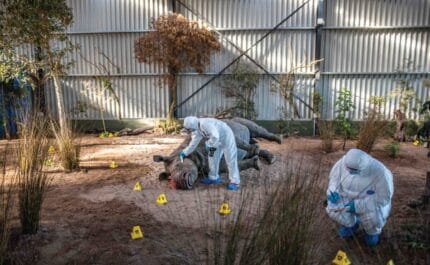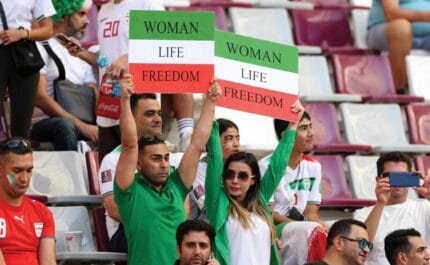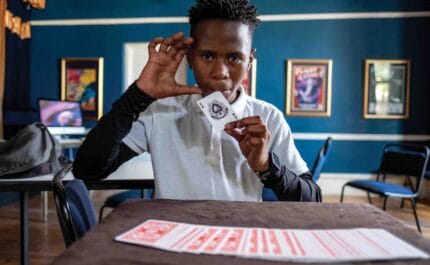Remembering Jo Cox MP
On 16 June 2016, in the run-up to the UK’s referendum on Brexit, the Labour MP Jo Cox was fatally shot and stabbed outside a library in Birstall, in her West Yorkshire constituency of Batley and Spen. In DG #23, we spoke to Tim Dixon, her friend and a co-founder of the Jo Cox fund, about his memories of an incredible public servant and the difference she made

Alastair Grant / AP/Press Association Images
16th June 2016 (Taken from: #23)
“The night before Jo was shot I was having dinner in London with her husband, Brendan, and the director of Hope Not Hate, an organisation set up to combat extremism. In Jo’s constituency, Batley and Spen, 40 percent of police referrals for the threat of radicalisation were for far-right extremists and we were discussing how toxic the EU referendum debate had become. Not for a moment did we think Jo or any other politician was under an immediate threat. It just didn’t seem like something that would happen in Britain.
The following day I was with Brendan again, having lunch, when he got the call to say that Jo had been attacked. It was clear that it was serious and he rushed to get a train to be with her. I raced home and turned on the TV. Within 15 minutes the news reports were all about Jo. I thought she must have been caught up in something, maybe she stepped in to save somebody – that is something she would do. It didn’t cross my mind that somebody had deliberately targeted her, she was too good a person. As the story unfolded we realised with horror what had happened. Jo was gone.
Jo’s friends and I didn’t know what to do, but we had to do something. So we set up a GoFundMe page for donations in Jo’s name for the charities she supported. It wasn’t much but we had a desperate need to do something positive in the most negative of times. The response gave us all hope. Money started coming in, from £5 donations to thousands of pounds at a time, with notes attached like ‘I’m so sorry’ and ‘This isn’t us’. We reached £500,000 within a day, a million pounds in a week. Over 45,000 people have donated so far and we have reached almost £1.9 million. It was the definition of the kindness of strangers. We wanted the money to go towards supporting Brendan and their two children, but he was having none of it. He was insistent that it went to causes close to Jo’s heart.
In the end the family chose three charities: the Royal Voluntary Service, the White Helmets and Hope Not Hate. The Royal Voluntary Service do a lot to enrich the lives of older people around the UK. The White Helmets are an organisation of volunteer search-and-rescue workers in Syria who have been nominated for the Nobel Peace Prize, and Hope Not Hate’s work seems more important now than ever.
We need to make sure that others aren’t scared to follow in her footsteps. That we encourage the next Jo Cox to step forward, and the next, and the next”
Because of the size of the donations we were able to make – £500,000 each – we talked with the charities and asked, ‘What would be a game changer for you?’ The White Helmets, who have saved more than 60,000 lives in Syria, said that 134 of their volunteers had died in the field. That is the nature of the barrel bomb attacks in Syria: one bomb hits and the White Helmets rush to help. The plane then circles back and drops another.
The White Helmets couldn’t use official donors’ funds to assist the families of these 134; they felt terrible about that as these were people who had sacrificed everything. So they set up a Hero Fund with Jo’s money which will help those families and White Helmets who have been seriously injured risking their lives to save others. At Jo’s memorial service in Trafalgar Square, Raed Saleh, head of the White Helmets, travelled from Syria to present a symbolic white helmet to her family. Watching him place that helmet on that stage, thinking of what they had sacrificed and what Jo had now sacrificed, was one of the saddest moments in my life. Jo championed them. Now they were championing her.
It is rare to find somebody who entirely gives themselves over to others, but Jo was a true public servant who died in the line of duty. Brendan would say whenever she had a constituency meeting she would always come home late. She’d keep talking to people about what mattered to them, no matter how long that took. She always had time for others. She really was a remarkable human being. She cared about the lives of people she’d never met but who were in need – whether they voted for her or were in a war zone on the other side of the world. She just saw people and when she saw they were in trouble she got on her feet and did something about it. She was very proactive. I feel that fire now as do most of Jo’s friends. We’ve never been more motivated and emboldened to do more – we realise what is at stake.
Jo was also an incredible mother. When she was in London she and the family lived on a houseboat on the Thames and I would be there often for dinner or to talk work. I treasure the memories of her playing around with the kids, laughing, putting them to bed, then three minutes later discussing what could be done about the refugee crisis.
Although it is unimaginably sad, I feel positive for her children. She and Brendan instilled in them such love and such strength of character that they will be fine. It’s the country I worry for more. There is such a deep sense of social fracture and we have lost a remarkable woman who would have made a difference. We need to make sure that others aren’t scared to follow in her footsteps. That we encourage the next Jo Cox to step forward, and the next, and the next.
Looking back three months on, post referendum, it seems we are in a strange moment in the post-war era. There is so much hatred and extremism. You have Trump in the US, the L&J [Law and Justice] party in Poland, the NFA [New Flemish Alliance] in Belgium, elements of the Leave campaign in the UK, all telling people that their country is at risk. If public figures are saying people have to fight back to save their country, then you can’t be surprised if susceptible people act on that. We need to turn the volume down. This is not a game, this is more than just politics.
Jo’s death needs to be a moment we remember and reflect on for years to come. No constituent had ever killed their MP in Britain’s long history. We need to make sure that this is the last time. I hope it is the moment when we realised we were hurtling towards a cliff and pulled ourselves back rather than carrying on regardless. We need to change the rhetoric if communities are going to hold together. As Jo said in her maiden speech in Parliament, ‘We have far more in common with each other than things that divide us.’”
A foundation has been set up in Jo Cox’s name to continue her work. Donations can be made at gofundme.com/jocox
Slow Journalism in your inbox, plus infographics, offers and more: sign up for the free DG newsletter. Sign me up
Thanks for signing up.








